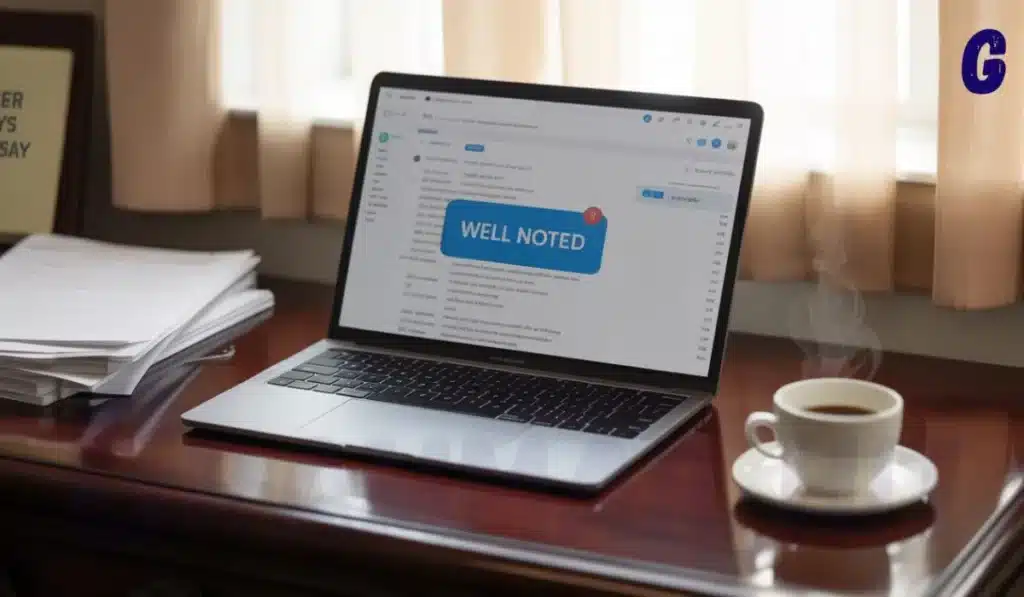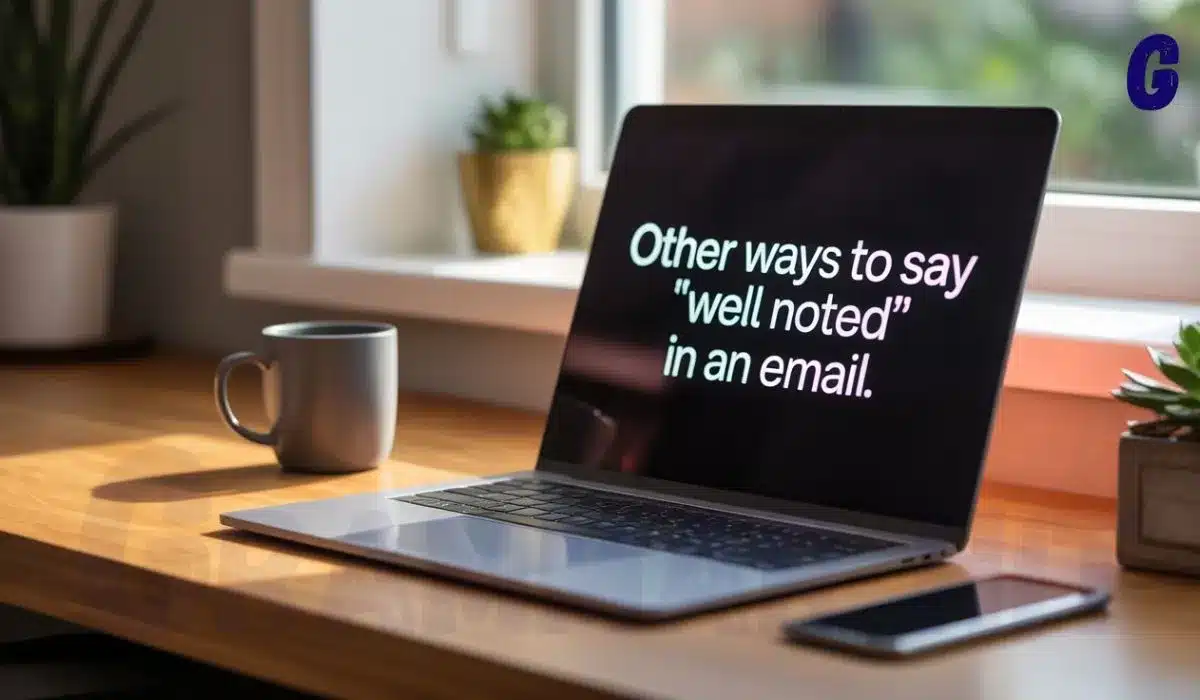Email communication plays a major role in professional and personal correspondence. One common phrase you might come across is “well noted”—a polite acknowledgment that you’ve received and understood a message. While it serves the purpose, it can sound formal or repetitive if overused. In this article, we’ll explore alternative ways to say “well noted” in an email, along with usage examples. Whether you’re writing to your boss, colleague, or client, this guide will help you sound more human, thoughtful, and intentional.
We’ll also touch on related real-life keyword phrases people in the U.S. search for—ranging from dishwasher not cleaning well to get well notes for flowers—and how clarity in communication is vital across various contexts.
Why You Should Avoid Overusing “Well Noted”
“Well noted” may sound polished, but it can sometimes come off as cold or dismissive. For example:
Boss: “Please ensure all reports are submitted by 5 PM.”
Employee: “Well noted.”
This sounds robotic. A better reply might be:
“Thanks for the reminder. I’ve added it to my calendar and will submit them on time.”
Your tone matters, especially in workplace communication.
Professional Alternatives to “Well Noted”
Here are professional yet friendly phrases you can use instead of “well noted.”
1. Understood. Thanks!
Use this when you want to keep it short but clear.
Example:
“Got it. Thanks for clarifying the deadline.”
2. Thanks for the update—I’ll take care of it.
Perfect when you’re acknowledging an action item.
Example:
“Thanks for the update about the project scope. I’ll review it and adjust accordingly.”
3. I’ve made a note of it.
Gently implies you’ve recorded the info.
Example:
“I’ve made a note of the meeting change—will be there at 2 PM.”
4. Acknowledged. I’ll proceed as discussed.
Sounds more assertive and proactive.
Example:
“Acknowledged. I’ll proceed with the invoice as discussed.”
5. Thanks—message received.
Casual, clear, and confident.
Example:
“Thanks—message received. I’ll check in with the team.”
Creative and Friendly Alternatives
When writing less formal emails (to coworkers, peers, or clients with whom you have rapport), try these:
6. Sounds good!
Simple, casual, and agreeable.
7. Got it—thanks for the heads-up.
Acknowledges and appreciates the message.
8. Makes sense—I’ll get on it.
Good when confirming understanding and action.
9. I’m on it.
Direct and confident.
10. Will do—thanks!
A natural way to confirm receipt and commitment.
When to Use Humor or Emotion
Sometimes, a situation calls for warmth, empathy, or even humor. For example, if someone sends you a funny get well note or a thank you note for a get well gift, your response should reflect genuine emotion:
Example:
“That note totally made my day—thank you for the laugh and good wishes!”
This is far better than a cold “well noted.”
How Communication Matters in Other Contexts
Let’s connect the concept of clear acknowledgment to other everyday issues and searches, where clarity and empathy are essential.
1. Home Appliances Not Working Well
You wouldn’t just say “noted” when someone says their Frigidaire dishwasher is not washing well or that the Bosch dishwasher isn’t cleaning well. You’d respond with concern and offer help or next steps.
Better Response:
“Thanks for the heads-up! I’ll check the manual and get back to you with a fix.”
Other examples:
- Clothes dryer not drying well? Acknowledge the frustration, then suggest trying the lint filter or settings.
- Bathtub not draining well? “Let’s try a plunger before calling a plumber.”
2. Water System Troubleshooting
Communication also plays a role when someone mentions:
- Well pump running but not building pressure
- New well pressure switch not turning on
- Well water not coming out of faucet
- Well pump not holding pressure
- Well pump not shutting off
These aren’t just mechanical issues; they’re household emergencies. Instead of saying, “noted,” say:
“I understand—that sounds urgent. Let’s test the pressure switch or check the circuit breaker.”
Similarly:
- If the well pump is not working after a power outage, suggest: “Try resetting the breaker or pressure switch—it may solve the issue.”
Clear, action-driven responses help build trust, especially in home maintenance conversations.
3. Pet and Plant Care
Empathy is everything when it comes to pets. Imagine your friend says, “My cat’s not jumping as well lately” or “My dog’s not feeling well after shots.”
Don’t reply with “noted.” Instead, try:
“Poor thing—hope they feel better soon. Did the vet say anything?”
Even for plants, like “my money tree’s not doing well”, a thoughtful response like “Maybe it’s overwatered? Let’s check the soil” shows you care.
4. Sending Emotional Support
If a coworker receives flowers or a card—like a get well note for flowers or a thank you note for get well flowers—the language you use should reflect warmth.
Instead of “well noted,” say:
“Those flowers were beautiful—glad to see you’re surrounded by love and support.”
5. Tech and Home Repairs
In less personal, but still crucial areas—like someone reporting a sliding glass door not sliding well or a window well not draining—acknowledging the issue clearly makes a difference.
Example:
“That’s definitely something we should fix soon. I’ll schedule a repair visit.”
If water’s not coming out properly—“water not coming out of faucet well”—respond with actionable support, not vague acknowledgment.
Religious and Cultural Phrases

Sometimes, people include faith-based or cultural phrases in conversations, such as “It is well with my soul music notes”—a reference to a famous hymn. These shouldn’t be brushed off with a mechanical reply.
A warm response would be:
“That hymn is beautiful. It brings so much peace during tough times—thank you for sharing it.”
SEO Tip: Why Google Loves Rich, Clear Language
Search engines prioritize content that reflects user intent and satisfies search queries. This is why terms like:
- “Well pump pressure switch not working”
- “Get well soon note for boss”
- “Thank you note for get well gift”
must be naturally embedded in helpful, human-sounding content. When you acknowledge problems or greetings in emails or texts, don’t just say “well noted.” Speak like a real person.
Summary Table: Better Alternatives to “Well Noted”
| Situation | Better Phrase |
|---|---|
| Professional updates | “Acknowledged. I’ll take care of it.” |
| Casual teamwork | “Sounds good!” |
| Boss sharing info | “Thanks for the update—I’ve noted it.” |
| Troubleshooting with client | “Let me look into that—thanks for flagging.” |
| Get well messages | “Thanks! That really lifted my spirits.” |
| Home repair issue shared | “Understood—I’ll schedule someone.” |
| Pet concerns | “That’s worrying—hope they’re okay soon.” |
| Religious or musical reference shared | “That’s such a peaceful hymn. Love it.” |
Final Thoughts
Saying “well noted” isn’t wrong—but it’s often not enough. Words matter, and in our fast-paced digital world, taking the time to write thoughtful responses can make all the difference. Whether you’re acknowledging an update from your boss, responding to a dishwasher complaint, or comforting someone whose dog isn’t feeling well after shots, use your words to show that you really care.

Grammar Hit is your trusted language companion, offering expert grammar tips, practical guides, and engaging resources to help you write and communicate with confidence and clarity.

